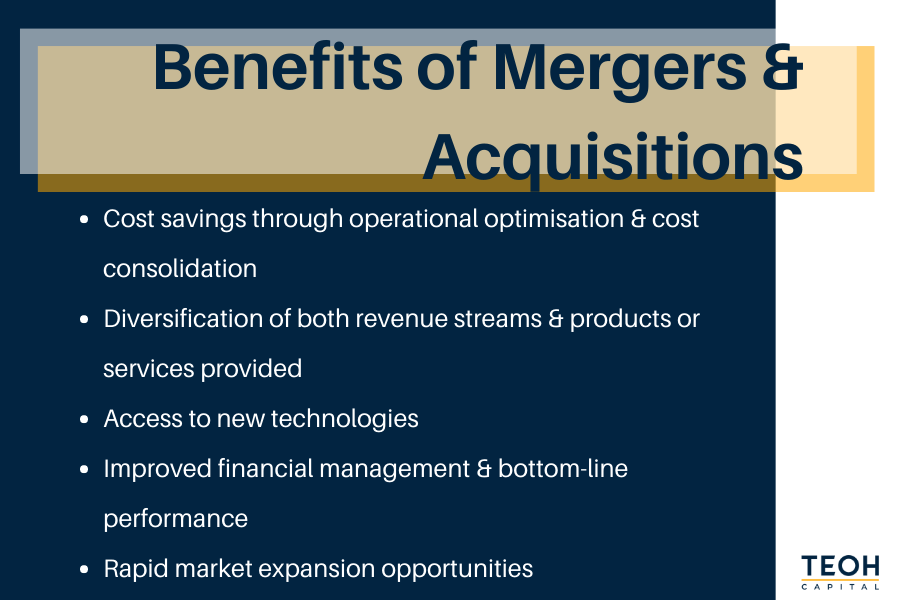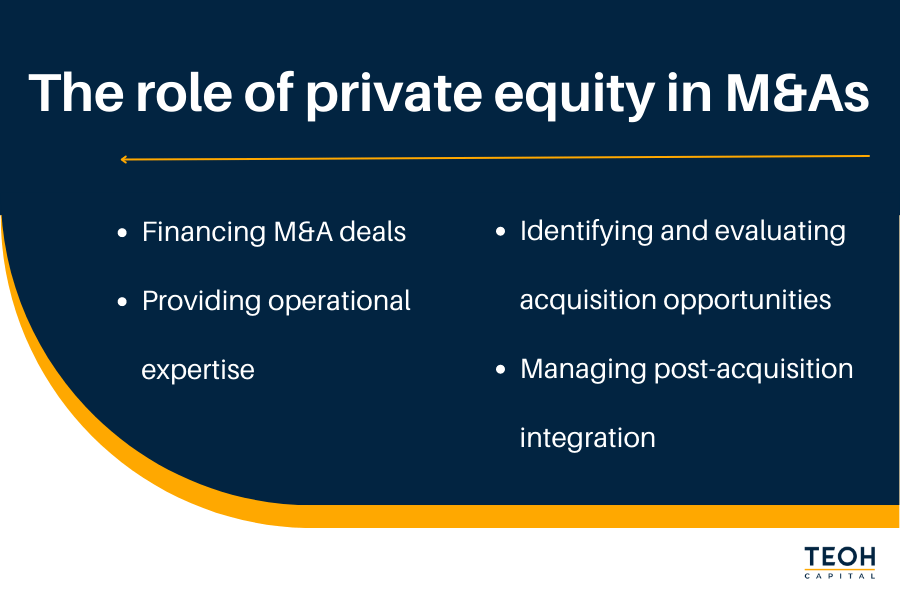
Mergers and Acquisitions (M&A) transactions are a common and often essential component in corporate growth. Empowering the rapid expansion and scaling of companies through strategic partnerships, private equity firms play a crucial role in facilitating M&A transactions for private companies.
In this article, we’ll delve into the nuanced role that private equity firms play in M&A transactions with insights extending beyond the obvious aspects of brokering deals and financing. From identifying and evaluating acquisition targets, to providing operational experience and managing the complex process of post-acquisition integration, we’ll examine the full spectrum of private equity’s involvement in M&A transactions.
Understanding Merger and Acquisition Transactions
Before we dive into the nuances of M&A transactions and private equity, let’s take a moment to the definition, types, and benefits of M&A transactions on a broad spectrum.
Definition of M&A transactions
Mergers and Acquisitions transactions or M&A transactions simply refer to the consolidation of two of more companies into a single entity. The process may involve the merger of two companies that then form a new company, or an acquisition whereby one company will absorb all of the assets and liabilities of another company.
M&A transactions are size-agnostic and can occur with companies of any size. From small businesses to multi-national enterprises, mergers and acquisition transactions are typically driven by the intention to capture new markets, access new technologies, or simply under the guise of financial reasons.
Types of M&A transactions
Mergers and Acquisitions (M&A) transactions be classified into a number of different categories.
Acquisition: An acquisition merger is a straightforward merger where one company simply buys another company. Acquisitions may take the form of a stock purchase, asset purchase, or a combination of both. Depending on the nature of the merger, acquisitions may be classed as either friendly or hostile.
Merger: A merger is when two companies combine to form a single entity – whether it be two companies in the same industry, two companies in the same supply chain, or two companies in completely different industries.
Bolt-on Acquisition: A bolt-on acquisition refers to when a company is added by a private equity firm to one of its platform companies. Generally, this will occur when a private equity firm has partnered with a large company in a specific industry, and the PE firm then facilitates acquisition growth through bolt-on acquisitions.

Benefits of M&A transactions
M&A transactions offer a myriad of benefits for companies. Benefits from mergers and acquisitions can be both strategic and financial and help companies to expedite growth, achieve long term success, and profitability exit their business. Some other key benefits of M&A transactions include:
- Cost savings through operational optimisation and cost consolidation
- Diversification of both revenue streams and products or services provided
- Access to new technologies
- Improved financial management and bottom-line performance
- Rapid market expansion opportunities
Through M&A transactions, companies can effectively eliminate growth pain-points, streamline operations, and increase business profitability.
The Role of Private Equity Firms in M&A Transactions
The role of private equity in M&A transactions often involves financial and operational support, identifying new opportunities, and managing the intricacies and nuances of the M&A process from start to finish.
Financing M&A deals
Private equity firms play a critical role in financing M&A deals by providing the upfront capital required to complete transactions. With access to significant funds and a comprehensive understanding on the process of financing M&A transactions, PE firms are well-positioned to support companies that are looking for growth opportunities through mergers and acquisitions.
Providing operational expertise
In addition to financial resources, private equity firms bring operational expertise to the table. By identifying operational inefficiencies and helping companies to streamline internal processes, PE firms play a critical role in ensuring that M&A transactions deliver the best outcome for both the acquiring and the target companies.
Identifying and evaluating acquisition opportunities
Private equity firms play an important role in identifying and vetting acquisition opportunities for their portfolio companies. Market knowledge and industry expertise means that PE firms are able to identify target companies that are well position for growth. Throughout the process, PE firms undergo an extensive due-diligence process to evaluate the financial, operational, and strategic fit of the target company.

Managing post-acquisition integration
PE firms play an important role in facilitating M&A transactions, particularly leveraged buyouts. By applying a track record of industry experience and expansive resources, PE firms can help to finance the acquisition and add value to the target company through operational improvements and proven growth initiatives.
Private Equity Firms and M&A Deal Structuring
Due diligence process
For private equity companies, the due diligence process is a critical step in M&A transactions and involves a number of key steps, including:
- A thorough audit of a company’s financial, operational, and legal history
- A comprehensive market assessment and competitive analysis to understand the unique selling proposition (USP) and market position of the target company.
- Evaluating the management team and key personnel of the target company.
- Identifying risks, liabilities, and other factors which may impede immediate or future successes.
Private equity firms bring significant experience to the due diligence process. Leveraging a deep understanding of M&A transactions, PE firms are able to provide valuable insights and recommendations to their portfolio companies.
Negotiating terms of the deal
When it comes to negotiating the terms of a deal and navigating the complex paperwork that is involved, the benefit of private equity support comes to the fore. PE firms bring a wealth of experience and expertise to the negotiating table and help companies to structure deals that are in their best interests. Private equity firms will use their negotiating experience to:
- Identify key terms and conditions to be included in the agreement
- Advise the company on any risks and benefits involved with different deals
- Develop a negotiation strategy that protects the interests of both parties
The role of the private equity firm is to protect the best interests of their portfolio companies and ensure that the terms the deal are favourable for them, but fair for both parties.
Managing risk in M&A transactions
M&A transactions are fraught with risks and obstacles to overcome. PE firms bring a wealth of experience to the transaction and are able to effectively evaluate and mitigate risk throughout the process in a way that protects their portfolio companies.
Final Thoughts
Private equity firms play a vital role in the process of M&A transactions, bringing a wealth of experience, financial resources, market knowledge, and risk management to the table. Working closely with their portfolio companies and protecting their interests, PE firms help to manage the minutia of the M&A process and deliver value for all parties involved.
Related Articles
What you need to know about private equity
Fundraising is often daunting for business owners. Raising capital can allow the company to flourish, but finding the right investment partner can be time-consuming and difficult. Asking for money might be outside your comfort zone. Not asking for it can keep you small.
SaaS Funding: Capital Growth Options for Software Companies
There’s no doubt about it - software as a service, or 'SaaS', is flourishing, becoming one of the most prevalent business models to emerge over the last decade. And as more tech-businesses continue to develop cloud-based solutions, many require funding for product development, marketing, and the resources...
Why Family Businesses Are Ideal for Private Equity
Private equity firms invest in companies to enhance their value and improve their prospects for capital growth. Many firms invest in growing businesses and long-standing brands, but one often overlooked investment target is family businesses. Family businesses run with long-term intentions and a strong...


